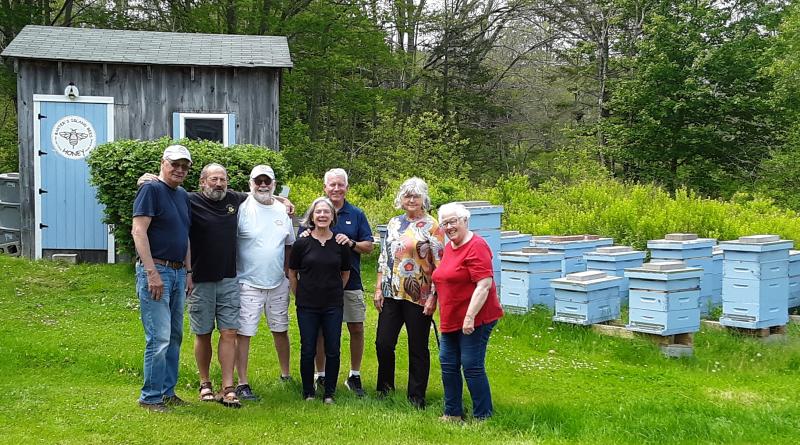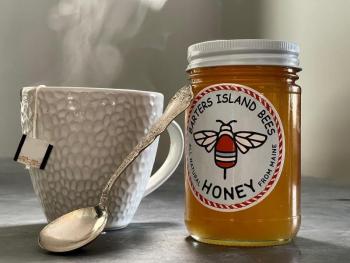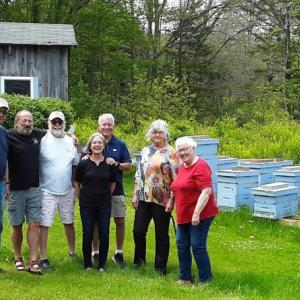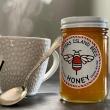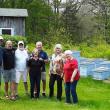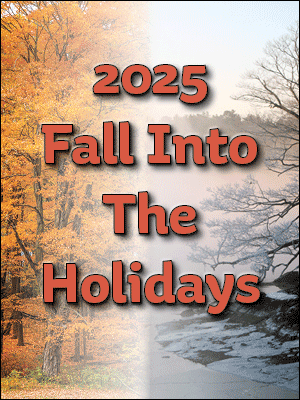Nature’s sweet alliance: The beekeepers of Barters Island
Ah summertime, when neighbors gather on the porch to relax over G & T’s.
But on Barters Island, one group of neighbors might well be getting together to discuss their sweet collaboration with nature – the “eco-friendly natural honey bee” business called Barters Island Bees.
During a recent visit to the farm on Oak Hill Road, the Register met with founder Denny Denniston who said he always had an interest in bees. He was joined by six fellow beekeepers who shared their experiences and observations about partnering with the island’s bees and running a licensed Maine apiary.
“I took an eight-week course in beekeeping and loved it,” Denniston explained. “I got a couple of hives and started talking about it with the neighbors and others started to put hives on their properties,” he said. His wife Donna saw the interest spread to their neighbors and friends. “It’s a great community,” she added.
First to welcome the pollinating tenants were neighbors James Jellison and Joanne Smith who host hives on their properties. What started with a few hives on Denniston’s land is now 40 hives on four separate properties.
Jellison took the seven-week interactive course offered by Knox Lincoln County Beekeepers Association. “They teach you everything from how to set up the hives to the physiology of the bees,” he said. He also worked with Denniston for a year. “Anyone interested should find someone who has a lot of hives and use them,” Jellison suggested.
“Take a course and find a mentor,” Denny agreed.
What about bee stings? “You can hear them revving up ...so you know when they’re on edge,” Smith said. “They’re very gentle, they don’t sting unless they have to because they die when they sting.”
Nature has its own timing and rhythm, but a little assist from the caring humans on Barters Island can be a big help. For example, the beekeepers feed the bees blocks of sugar to help them survive winter. “We usually lose about 20% of the hive in winter. The bees flex their wings around the queen to raise the temperature around her to 95F,” Denny said.
Evelyn and Mel Shahan also host hives for the non-profit and have friends in New Jersey who have bees. The couple find the social insects fascinating and complex.
Honey is harvested from Barters Island Bees hives twice a year, usually in early summer and late fall, Denny explained. It is processed using centrifugal force to remove the honey.
The business sells the honey at Pinkham’s Market, Eventide, Railway Village, East Boothbay General Store and Treats in Wiscasset. It is also sold at the Thursday farmer’s market in Boothbay. A portion of the profits from the farmer’s market sales are donated to Veggies to Table. Barters Island Bees also donated honey and a couple of hives to the organization.
“It’s expensive to do and hard to make money from it,” Denny said. “Last year was a bad year and we only had 900 pounds. This year will be more, maybe 1,500 pounds.”
The Dennistons make up the honey for sale in small batches in their kitchen. “My mixer makes about 15 pounds at a time,” Donna said. Barters Island Bees offers creamed and “runny” honey using only organic flavorings.
Like most beekeepers, the neighbors share concerns about colony collapse. “Worker bees only live about a month,” Bruce McElwain explained.
Habitat reduction from development of property, pesticides and Varroa mites are three reasons Denny gave for colony collapse. The mites destroys the bees’ larvae and bring viruses which can be treated with natural substances, he said.
Avoiding pesticides harmful to bees can help as well as leaving spring dandelions in place. They are the primary source of food for bees at that time, which gave rise to “No Mow May,” to help pollinators. “And one out of every three bites of our food comes from pollinators,” McElwain added.
The group also advises those who want to help to plant bee-friendly flowers milkweed, knot weed, bee balm, sedum, cat mint and willows are all on the “bee” list.
And if you find a jar of crystallized honey in your pantry, do not throw it out!
“Honey never goes bad,” Donna said.


